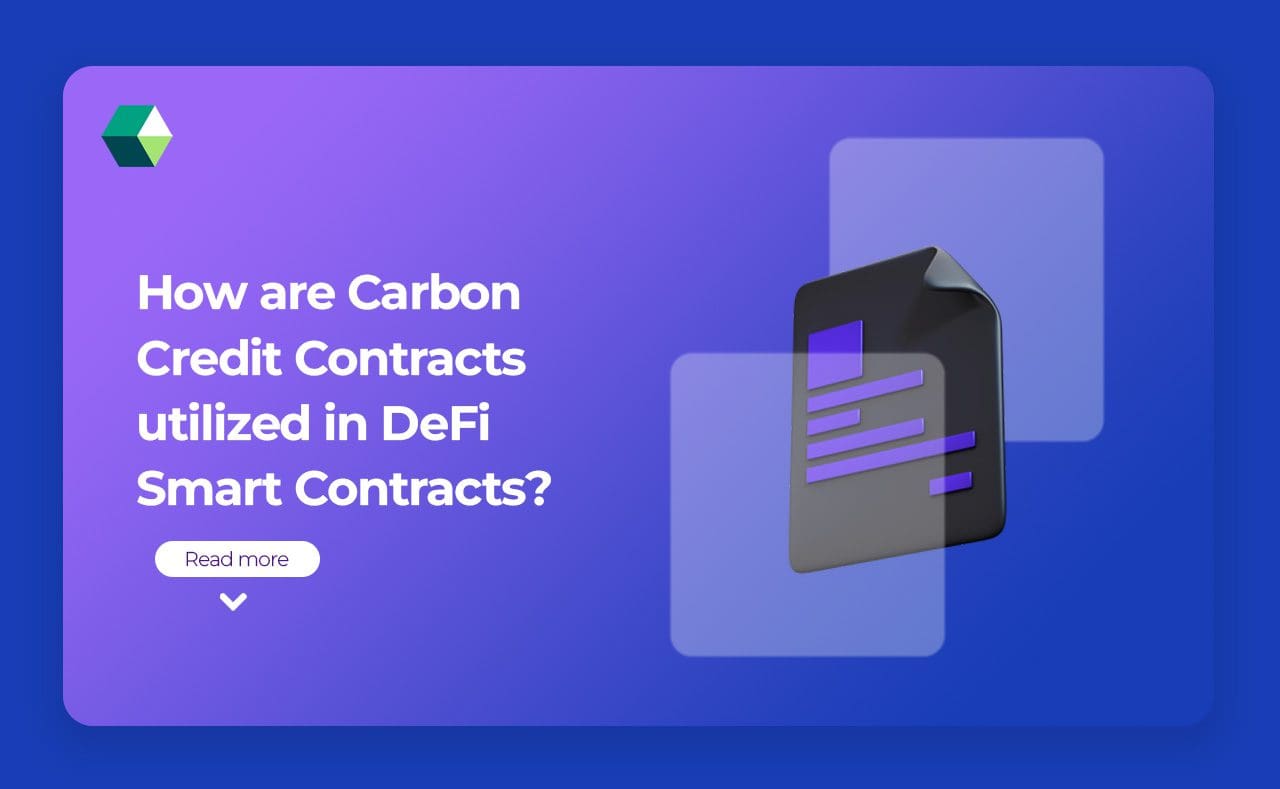The emergence of Decentralized Finance (DeFi) has introduced numerous innovations that are reshaping traditional financial systems. One such innovation is the integration of carbon credit contracts into DeFi platforms. These contracts leverage Smart Contracts to manage and trade carbon credits, aligning financial activities with environmental sustainability.
What is a Carbon Credit Agreement in DeFi?
A carbon credit agreement in DeFi refers to a digital contract on a blockchain that represents a unit of carbon dioxide (CO2) reduction or offset. This agreement is encoded into a smart contract, automating the process of trading, verifying, and retiring carbon credits. Essentially, it is a blockchain-based instrument that ensures that carbon credits are accurately tracked and managed.
Carbon credit agreements are integral to the DeFi ecosystem because they provide a transparent and efficient way to incorporate environmental sustainability into financial transactions. In traditional carbon markets, the process of trading and verifying carbon credits can be cumbersome and opaque. DeFi platforms address these challenges by using smart contracts to automate and streamline these processes, ensuring that carbon credits are issued, traded, and retired accurately.
How Are Carbon Offset Contracts Managed in DeFi?
Carbon offset contracts are managed in DeFi through smart contract technology, including Name Service Contracts. Smart contracts automate the issuance, transfer, and retirement of carbon credits, eliminating the need for intermediaries and reducing administrative overhead.
In DeFi, these contracts ensure that once a carbon credit is issued, it can be easily traded or retired based on the terms encoded within the contract. This automation streamlines the entire process, from verifying the credit’s validity to executing transactions. As a result, DeFi platforms provide a secure and efficient environment for managing carbon offset contracts, ensuring compliance with environmental regulations and enhancing transparency. Name Service Contracts further enhance the process by providing unique identifiers to each carbon credit, ensuring traceability and reducing the risk of duplication or fraud.
Why Are Carbon Credit Contracts Crucial in DeFi?
Carbon credit contracts are crucial in DeFi for several reasons:
-
Transparency
Blockchain technology, which underpins DeFi, provides a transparent ledger of all transactions. This transparency extends to carbon credit contracts, ensuring that all activities related to carbon credits are visible and verifiable. This helps build trust among participants and stakeholders.
-
Efficiency
Traditional carbon credit markets can be slow and bureaucratic. By utilizing smart contracts, DeFi platforms streamline the issuance, trading, and retirement of carbon credits. This automation reduces administrative overhead and accelerates the transaction process.
-
Compliance
Compliance with environmental regulations is essential for ensuring that carbon credits meet required standards. Smart contracts enforce these regulations by automating compliance checks and ensuring that all credits are valid and properly accounted for.
-
Accessibility
DeFi platforms lower the barriers to entry for participating in carbon offsetting. By providing a decentralized marketplace for carbon credits, these platforms make it easier for a broader range of individuals and businesses to engage in environmental sustainability efforts.
Overall, carbon credit contracts play a vital role in integrating environmental sustainability into the DeFi ecosystem. They enhance transparency, efficiency, and compliance while making carbon offsetting more accessible to a global audience.
How Do DeFi Protocols Handle Carbon Credits?
DeFi protocols use Blockchain Technology and smart contracts to manage carbon credits efficiently and transparently. Here’s how they do it:
Issuance: Carbon credits are issued from verified projects and recorded on the blockchain. Smart contracts embed details about the credit’s origin, ensuring transparency and authenticity.
Trading: Decentralized exchanges (DEXs)Decentralized exchanges (DEXs) handle the buying and selling of carbon credits. Smart contracts automate trades, cutting out intermediaries and reducing costs.
Verification: Smart contracts cross-check credits against verified CO2 reductions, ensuring they are genuine and reducing fraud risk.
Retirement: Carbon credits are marked as retired on the blockchain once used for offsetting emissions. This prevents double-counting and ensures accurate records.
Management: Blockchain and smart contracts streamline Carbon Credit Management, addressing traditional market challenges and enhancing security.
DeFi protocols, also known as Decentralized Finance Protocols, offer a more efficient and transparent solution for managing and trading carbon credits using advanced technology.
What Benefits Do Carbon Credit Agreements Offer DeFi?
Carbon credit agreements offer several benefits to DeFi platforms, enhancing their functionality and impact:
-
-
Enhanced Transparency
By utilizing blockchain technology, carbon credit agreements ensure that all transactions are recorded on a public ledger. This transparency reduces the risk of fraud and provides participants with a clear view of the carbon credit market.
-
-
Improved Efficiency
Smart contracts automate many of the processes associated with carbon credits, such as issuance, trading, and retirement. This automation reduces the need for intermediaries and streamlines operations, making the carbon credit market more efficient.
-
Broader Participation
DeFi platforms lower the barriers to entry for carbon offsetting, allowing a wider range of participants to engage in environmental sustainability efforts. This increased accessibility promotes broader adoption of carbon credits and supports global climate goals.
-
Compliance Assurance
Smart contracts enforce adherence to environmental regulations by automating compliance checks and ensuring that all carbon credits meet required standards. This helps maintain the integrity of the carbon credit market and ensures that credits are valid and properly accounted for.
-
Market Liquidity
By integrating carbon credits into DeFi platforms, these agreements create a more liquid and accessible market for environmental credits. This increased liquidity encourages greater participation and trading of carbon credits, enhancing the overall impact of carbon offsetting.
Overall, carbon credit agreements provide significant benefits to DeFi platforms, improving transparency, efficiency, and accessibility while supporting global sustainability efforts.
How Can Carbon Credit Smart Contracts Enhance DeFi?
Carbon credit smart contracts can enhance DeFi in several key ways:
-
Automated Transactions
Smart contracts automate the issuance, trading, and retirement of carbon credits, reducing the need for manual intervention and minimizing the risk of errors. This automation streamlines operations and enhances the efficiency of carbon credit management.
-
Real-time Verification
Blockchain technology enables real-time verification of carbon credits, ensuring that all transactions are accurate and up-to-date. This real-time verification enhances transparency and reduces the risk of fraud.
-
Increased Security
The decentralized nature of blockchain enhances the security of carbon credit transactions. Smart contracts provide a secure and tamper-proof environment for managing carbon credits, protecting against unauthorized access and fraud.
-
Efficient Market Creation
Integrating carbon credits into DeFi platforms creates a more liquid and accessible market for environmental credits. This increased market liquidity encourages greater participation and trading of carbon credits, supporting broader adoption of sustainability practices.
-
Enhanced Compliance
Smart contracts enforce adherence to environmental regulations by automating compliance checks and ensuring that all carbon credits meet required standards. This helps maintain the integrity of the carbon credit market and ensures that credits are valid and properly accounted for.
-
Innovative Solutions
Carbon credit smart contracts enable the development of innovative solutions for managing and trading carbon credits. By leveraging blockchain technology and DeFi platforms, these contracts pave the way for new approaches to carbon offsetting and environmental sustainability.
Incorporating carbon credit smart contracts into DeFi enhances operational efficiency, transparency, and security while promoting broader participation in environmental sustainability efforts.
Integrating carbon credit contracts into DeFi smart contracts advances both sustainability and financial technology. Blockchain and smart contracts enable efficient, transparent management and trading of carbon credits. This integration supports environmental goals and aligns with the broader DeFi movement, driving innovation and progress. Smart Contract Development further enhances the effectiveness and adaptability of these systems.
Why choose Nadcab Labs for carbon credits?
Nadcab Labs offers carbon credits to enhance efficiency, transparency, and sustainability in markets. They provide secure smart contracts on various blockchain platforms, ensuring safe transactions and ownership transfer. With their expertise in blockchain technology, Nadcab Labs delivers innovative investment opportunities through asset tokenization, enabling quick ownership transfer and storage without relying on centralized finance entities. By partnering with Nadcab Labs, you can secure assets with blockchain-based securitization and implement a strategic approach to establish a strong foundation for Security Token Offerings (STOs). Their Blockchain Development Services ensure a cutting-edge approach to your investment and asset management needs.







